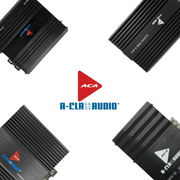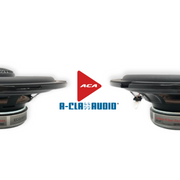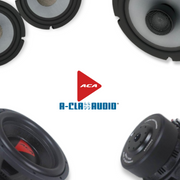Improving your car's sound system can turn every journey into a great audio experience. A key component to achieving powerful, clear sound is the amplifier. Choosing the right amplifier may seem complicated, but by understanding a few basic concepts, you can make an informed choice. Here is a detailed guide to help you select the perfect amplifier for your car audio system.
1. Understanding Amplifier Types
There are several types of amplifiers, each designed to meet specific needs:
- Monoblock Amplifiers: Ideal for powering a subwoofer. They provide great power on a single channel.
- 2 Channel Amplifiers: Used to power two speakers or a subwoofer. They can be bridged to increase power.
- 4 Channel Amplifiers: Perfect for powering four speakers, or two speakers and a subwoofer in bridged mode.
- 5 Channel Amplifiers and more: Offer an all-in-one solution to power all speakers and a subwoofer.
2. Power and RMS
Power is one of the most important criteria. It is crucial to focus on RMS (Root Mean Square) power, which represents the continuous power that the amplifier can deliver, unlike peak power which is higher but temporary.
- Power Matching: Make sure the RMS power of the amplifier matches that of the speakers and subwoofers. An imbalance can cause distortion or damage your equipment.
- Impedance: Most amplifiers and speakers come in 2 ohm and 4 ohm versions. Check that the amplifier impedance is compatible with that of your speakers.
3. Technical Characteristics
Some features can improve your experience and sound quality:
- High Pass Filter (HPF) and Low Pass Filter (LPF): These filters allow the appropriate frequencies to be directed to the speakers (treble) and subwoofers (bass).
- Parametric Equalizer: Offers precise control over frequencies to adjust the sound to your preferences.
- Signal Detection and Automatic On: Practical to avoid having to manually turn on the amplifier every time you start your car.
4. Installation and Compatibility
- Dimensions and Space: Make sure the amplifier fits into the available space in your car. Take accurate measurements before purchasing.
- Ventilation: Amplifiers generate heat. Good ventilation is essential to avoid overheating.
- Connection Compatibility: Check that your amplifier's connectors are compatible with those of your current system.
5. Budget
As with any purchase, budget is a determining factor. Amplifier prices vary widely:
- Entry Level: Offer a good improvement over the original systems at a moderate cost.
- Mid-Range: Offer a good balance between performance and additional features.
- High-End: Provide superior sound quality with advanced features for demanding audiophiles.
Conclusion
Choosing the right amplifier for your car sound installation requires taking into account several factors: the type of amplifier, the power and compatibility with your speakers, the technical characteristics, the space available for installation and, well, sure, your budget. By carefully evaluating each of these aspects, you can transform your in-car listening experience and fully enjoy every musical note on the road. Happy installation and good sound journey!




